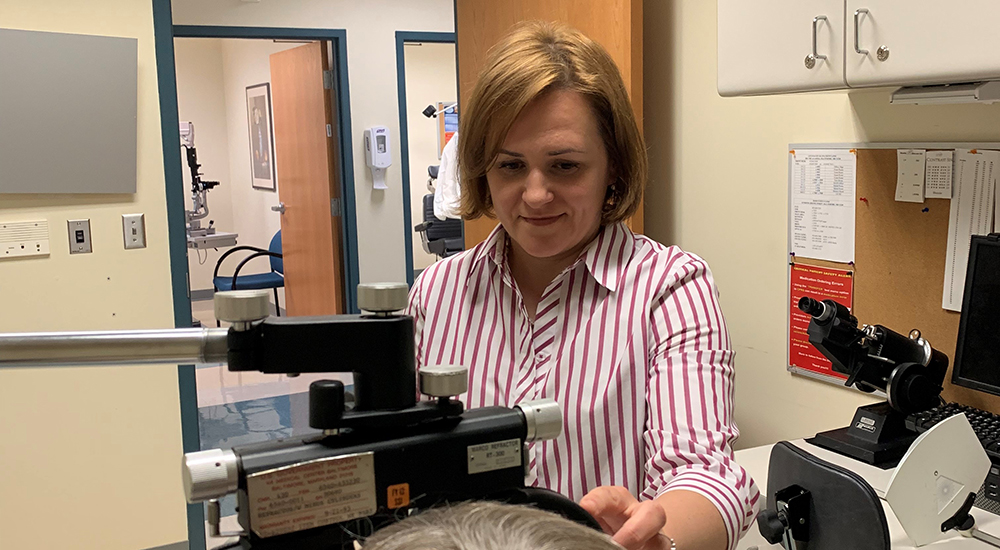Dr. Olga Whitman helps visually impaired Veterans meet their goals
When Veterans Richard Eller and William “Les” Tweed were hit by vision loss, the Advanced Low Vision Clinic at the VA Maryland Health Care System helped them regain much of the independence they thought they had to give up as a result of their impairment.
Eller and Tweed are among the more than four-million Americans affected by blindness or low vision, a number expected to double by 2050 thanks to causes including uncontrolled diabetes, age-related macular degeneration, glaucoma, cataracts, and birth conditions.
“Although many with low vision impairment are over age 65, vision loss or impairment has many causes and afflicts people of all ages,” said Dr. Olga Whitman, the clinic’s low-vision optometrist.
Air Force Veteran Eller, 73, enjoyed decent sight until his central vision diminished due to glaucoma. As his vision faded, so did his ability to drive, read and watch TV. Then he had his first appointment with Dr. Whitman.
“I felt like a kid in a candy store,” said Eller. “After a thorough eye exam to determine my vision level and needs, she provided so many tools and devices to help with everyday activities. My new best friend is the CCTV/OCR machine.” This is a combined closed-circuit television and optical character reader that allows users to switch between magnifying print up to 60 times and, when their eyes get fatigued, having the machine read the text aloud.

Tweed, 55, a Marine Veteran, had dealt with diminished vision since having a stroke at age 42. For him, the clinic was the answer to a prayer.
“In my career, I was in a leadership position and mentored others,” Tweed said, noting that vision impairment cost him a job he loved. “It can be depressing for a life-changing thing to happen and to become dependent on others.” But after his first clinic visit, “I felt hopeful for the first time in a long time. I was given so many advanced tools to use, including a specialty pair of reverse-telescope glasses customized for me. I was the second person in the U.S. to have a pair quite like this.”
Whitman explained that the Advanced Low Vision team works together to create an individualized treatment plan for each Veteran. “The vision rehab specialist, the mobility specialist and I all perform assessments first, then form a plan of care based on a patient’s remaining or functional vision. We work with Veterans to address their goals,” said Whitman. “Some goals might include wanting to safely perform daily activities like bathing, shaving, meal preparation, cooking, medication management, dialing the phone, money identification and vocational and leisurely pursuits.”
Providing hope with tools for independent living
Veterans are trained to use their remaining vision by employing optical devices to read mail and newspapers and identify medication labels, faces and signs. The clinical assessment may also include a home visit, after which the team might recommend changes to maximize safety and independence in daily activities.
“If a Veteran’s goals exceed what we can teach and offer here, we offer a referral to the Blind Rehabilitation Center at the VA Connecticut Healthcare System for an intensive 6-to-10-week inpatient stay,” Whitman said.
For Eller, Tweed and more than 600 Veterans struggling with vision impairment, the vision rehab team at the Maryland VA provides hope with tools for independent living.

Topics in this story
More Stories
Veteran was trained to collaborate with fellow Airmen. Having his buddy’s six was important, and still is.
It’s essential for Veterans to take action and prepare for tornados and spring storms while staying informed.
Army Veteran Jeffery Williams' journey is a testament to resilience, perseverance and the power of innovation in transforming lives.






wow this is so wonderful…keep it up
Crutch Caddy. Please view our new disability aid on the website listed below. Now available in the USA.
Many thanks,
Beau O’Donohue